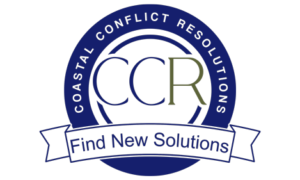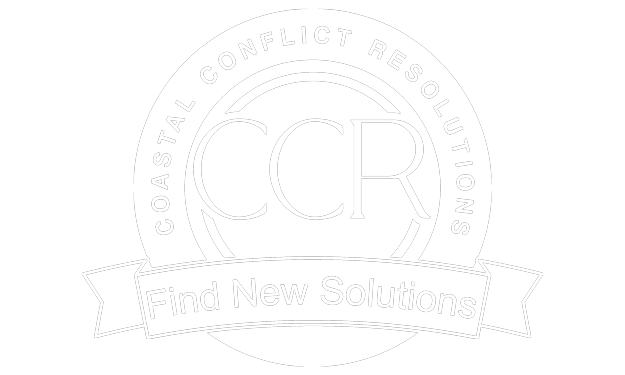In the world of business, conflict is inevitable. Disagreements can arise between business partners, clients, suppliers, or employees, and when they do, it’s crucial to address them quickly and effectively. Left unresolved, these conflicts can escalate, causing financial loss, reputational damage, and unnecessary stress. Fortunately, there is a powerful tool that can help businesses navigate these disputes—commercial mediation.
Commercial mediation is a dispute resolution process where a neutral third party helps facilitate a conversation between conflicting parties with the goal of reaching a mutually satisfactory solution. Unlike litigation, which can be costly and time-consuming, mediation is typically faster, more affordable, and less adversarial. This makes it an ideal choice for businesses looking to resolve their issues while preserving relationships and minimizing disruption.
If you’re facing a business-related dispute, Coastal Conflict Resolutions is here to assist. Call (843) 273-0029 to learn how commercial mediation can help resolve your conflict efficiently and effectively.
 What is Commercial Mediation?
What is Commercial Mediation?
Commercial mediation is a process where a neutral mediator helps businesses, organizations, and individuals involved in a dispute reach a mutually agreeable resolution. Unlike a court case or formal legal proceeding, mediation is informal, voluntary, and confidential. The mediator does not take sides or make decisions on behalf of the parties. Instead, their role is to guide the conversation, facilitate communication, and help the parties explore potential solutions.
Commercial mediation can be used to resolve a wide range of business-related disputes, including:
- Contract disputes: Issues arising from breaches of contract, misinterpretation of terms, or failure to fulfill contractual obligations.
- Partnership conflicts: Disagreements between business partners regarding roles, financial matters, or direction of the company.
- Supplier and vendor disputes: Conflicts related to the delivery of goods, services, or payment terms.
- Intellectual property disputes: Issues involving patents, trademarks, copyrights, or trade secrets.
- Employment-related disputes: Conflicts between employers and employees regarding terms of employment, compensation, workplace conduct, or benefits.
- Real estate disputes: Issues related to property agreements, leases, or zoning.
While the parties may have different perspectives on the issue at hand, the mediator helps foster constructive dialogue and works toward a resolution that satisfies everyone involved. Mediation also allows for more creative solutions, as the mediator can encourage options outside the traditional confines of the law.
Why Choose Commercial Mediation for Conflict Resolution?
Commercial mediation offers several advantages over traditional litigation or arbitration. Here are some reasons why businesses often choose mediation to resolve their disputes:
1. Cost-Effective
Litigation can be an expensive and time-consuming process, often requiring significant financial resources. Mediation, on the other hand, is typically more affordable, as it does not involve the same lengthy court procedures or fees. Additionally, since mediation can often be completed in a shorter amount of time, businesses save on legal costs, court fees, and lost productivity.
2. Faster Resolution
Business disputes that go to court can drag on for months or even years, delaying resolution and causing ongoing uncertainty. Mediation provides a faster alternative, often resolving disputes in just a few sessions. This allows businesses to get back to their regular operations without the distraction of a lengthy dispute.
3. Confidentiality
One of the key benefits of mediation is that it is confidential. This means that all discussions, statements, and agreements made during the mediation process are not disclosed to anyone outside of the mediation. This level of privacy allows businesses to discuss sensitive issues without fear of damaging their reputation or exposing internal matters to the public.
In contrast, court cases are part of the public record, and details of the dispute may become accessible to competitors, customers, and the media. With mediation, businesses can keep their disputes private, which can help protect their interests.
4. Preserves Business Relationships
In many cases, business disputes arise between individuals or entities that have ongoing relationships. Mediation is particularly effective at preserving these relationships because it focuses on cooperation and mutual understanding. The mediator works with both parties to ensure that the outcome is fair and acceptable to everyone involved, which helps avoid the antagonistic atmosphere that litigation can create.
By reaching a resolution through mediation, businesses can maintain strong professional relationships, which is important for long-term success. This is especially beneficial for companies that rely on partnerships, suppliers, or customer relationships to grow and thrive.
5. More Control Over the Outcome
In a courtroom setting, a judge or jury makes the final decision, and the parties involved have little control over the outcome. In mediation, however, the parties have more control over the final resolution. They can negotiate the terms of the settlement and reach an agreement that works best for their individual needs. The mediator helps guide the conversation, but the decision ultimately rests with the participants, ensuring that both sides are satisfied with the outcome.
6. Encourages Creative Solutions
Mediation allows for more flexible and creative solutions than traditional legal proceedings. The mediator can help the parties think outside the box and explore unconventional options that may not be available in a courtroom. This is especially beneficial in business disputes, where both parties may be looking for a unique solution that addresses their specific concerns.
How to Mediate Conflict in the Workplace
Workplace conflicts can arise in any organization, from misunderstandings between colleagues to disagreements over job responsibilities or policies. Regardless of the cause, resolving workplace conflicts quickly is essential to maintaining a positive and productive environment. Here’s how to mediate conflict in the workplace:
1. Establish Clear Guidelines
Before beginning the mediation process, it’s important to establish clear guidelines for how the conversation will unfold. This includes setting ground rules for respectful communication, ensuring that both parties will have an equal opportunity to speak, and reminding everyone involved that the goal is to reach a mutually acceptable resolution.
The mediator will also explain the process, clarify the role of the mediator, and confirm that everything discussed during the mediation will remain confidential. Establishing these guidelines helps create a safe and neutral environment where both parties can engage in open and honest dialogue.
2. Listen to Each Party’s Concerns
The mediator begins by allowing each party to express their perspective on the conflict. During this stage, it’s important for both parties to listen actively and respectfully without interrupting. The mediator will facilitate the discussion, ensuring that everyone feels heard and understood.
Listening carefully to each person’s concerns is essential for identifying the root cause of the conflict. Often, what seems like a simple disagreement may be based on deeper issues that need to be addressed before a resolution can be reached.
3. Identify Common Interests
Once both sides have had the opportunity to speak, the mediator helps identify areas of agreement and shared interests. This is an important step in the mediation process, as it helps to shift the focus from the problem to the potential solutions. By emphasizing common ground, the mediator helps both parties see that they are working toward a mutual goal.
Identifying common interests also allows the mediator to frame the conversation in a way that encourages cooperation and compromise, rather than fostering an adversarial atmosphere.
4. Explore Potential Solutions
The mediator then guides the conversation toward possible solutions. This is where the mediator’s role as a facilitator is crucial, as they help the parties brainstorm and explore different options that can resolve the dispute. The mediator may suggest potential compromises or solutions but will not impose any decisions.
It’s important for both parties to remain open-minded during this stage and consider alternative solutions that may not have been initially obvious. The mediator can help identify creative solutions that address the needs of both sides, which might include changes to work procedures, compensation, or other aspects of the workplace dynamic.
5. Reach an Agreement
The ultimate goal of workplace mediation is to reach a mutually acceptable agreement. Once both parties have discussed their concerns and explored potential solutions, the mediator helps the parties come to a final resolution. This agreement may be written down and signed by both parties to ensure that everyone is clear on the terms of the settlement.
Once an agreement is reached, the mediator may also discuss how to implement the solution and follow up to ensure that both sides are satisfied with the resolution.
Why Choose Coastal Conflict Resolutions for Commercial Mediation?
At Coastal Conflict Resolutions, we specialize in commercial mediation services for businesses in Myrtle Beach and the surrounding areas. Our skilled mediators have experience helping individuals and companies navigate a wide range of business-related conflicts, from contract disputes to workplace issues.
We offer the following benefits:
- Expert Mediators: Our mediators are trained professionals with a deep understanding of business disputes and conflict resolution.
- Confidential and Neutral: We provide a confidential, neutral setting where all parties can speak freely and work toward a solution.
- Tailored Solutions: We customize our mediation services to meet the unique needs of your business, helping you find a solution that works.
- Cost-Effective: Our mediation process is more affordable than litigation, saving your business time and money.
- Preserve Relationships: We help businesses resolve conflicts while maintaining positive professional relationships, which is crucial for long-term success.
If you’re dealing with a business dispute, whether in the workplace or with clients, Coastal Conflict Resolutions can help. Our mediation services offer a practical, effective way to resolve conflicts and restore harmony in your business.
Call us at (843) 273-0029 to get started with commercial mediation today. Let us help you resolve your conflict and keep your business running smoothly.




